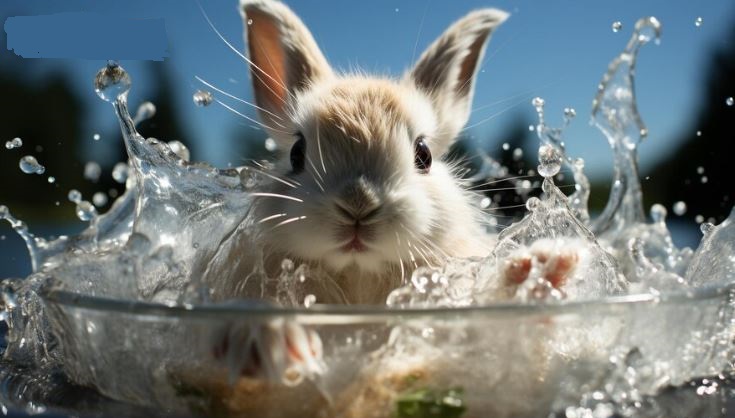Most of time, you have to see rabbits hopping around in meadows and gardens, not swimming in water. These activities are not preferred by rabbits; because bunnies have also abilities to swim in water. But do you have ever wondered if these furry creatures like water being swimming? Can rabbits swim perfectly or not?
Indeed, rabbits are capable to propel themselves in water using their forelimbs and hind limbs as early as 8 to 15 days after birth.
Through this article, we will help to settle this common question that most of rabbit owner’s ask, whether or not rabbits can swim; is it safe for them? And how do you care your rabbit before, during and after exposure to water.
Do Rabbits Like to Swim In Water?
Generally, rabbits don’t take enjoy in swimming, and fell most stressful being in water. Although, they are capable to swim if necessary, like as when escaping danger. But, it is not a natural or preferred activity for them.
Rabbit is one of prey animals, who have strong instinct to avoid potentially dangerous condition. However, bunnies feel vulnerable and anxious being in water.
When you do force bunnies to swim in water, then it can lead to significant stress. Cause of this, rabbits can get bad health implications. Being stress rabbits can have range of issues, from digestive problems to a weakened immune system.

So, they make more susceptible to illnesses. Moreover, a wet rabbit can also get a risk of hypothermia, because their fur need longest time to dry and they can quickly become cold.
Some breeds of rabbits have tolerance a shallow bath, if it is necessary for medical reasons or for cleaning purposes. But, you should be done with great care.
Ensure the water is lukewarm, keep away to wet their head, and finally dry them thoroughly afterwards.
Is It Safe for Rabbits to Swim?
Generally, swim is not safe for domesticated rabbit. However, they have technical ability to swim, but they are not ready naturally inclined to do, because may get stressful and even dangerous. Cause of this, pet rabbits can get suffer to hypothermia and respiratory issues. Due to their thick fur, they get more difficulties to regulate body temperature.
Besides, swimming pools can lead to health issues in rabbits from chemicals, water temperature, and bacterial infections. So, you should keep rabbits out of water, and facilitate the safe environments for exercise and play.
Swimming Abilities and Instincts
Although, rabbits have the physical ability to swim; but it is not a natural and preferred activity for them. Here, we will closer look at their swimming abilities and instincts:
Also Read: How to Play with Your Rabbit? Interactive Playtime
Swimming Abilities of Rabbits
Physical Capability
Hind Legs: Rabbits have most powerful hind legs that allow them to paddle effectively in the water. These legs necessary push them forward.
Coordination: Although, rabbits are not as graceful as aquatic animals, but they can coordinate their limb movements to swim and navigate through water if needed.
Endurance: Rabbits are a limited stamina, still can swim, but in short distances. If, they do swim as prolong; then it can be exhausting and dangerous for them.
Natural Buoyancy
Rabbits fur and body composition are different to other animal, so they have some natural buoyancy. This helps them stay afloat temporarily. Although, their fur get become waterlogged during swimming that making increasingly difficult and tiring.
Instincts Regarding Water
Prey Animal Instincts
Vulnerability: As prey animals, rabbits have a great sense of vulnerability. When they are in water, and then make them feel exposed, and unable to quickly escape predators.
Fight or Flight Response: When faced with water, a rabbit’s instinct is to avoid it unless absolutely necessary. For example, escaping from a predator where swimming might be the just one option.
Stress and Anxiety
High Stress Levels: Being in water they can cause significant stress and anxiety. This stress response gets due to their instinctual drive to stay safe and secure.
Health Implications: Bunnies can get chronic stress exposure to water or forced swimming. So, health problems can be posed in your bunnies like gastrointestinal stasis.
Habitat Preferences
Dry Environments: In the forest, rabbits mostly prefer to dry habitats such as burrows, grasslands, and forests. These environments support to cover and protect from predators.
Avoidance of Water Bodies: Typically, rabbits avoid to water bodies unless crossing them is unavoidable. Their natural environment has a rarely necessitates swimming. So, they get reinforce their instinct to steer clear of water.
What Should You Do If Rabbit Fall into Water?
If, your bunny falls into water, then you have to do act quickly and calmly to ensure their safety. Here’s a step-by-step guide on what to do:
Also Read: How to Keep Rabbits Nails Short Without Cutting Them? Full Guide
Remove the Rabbit from Water
- Act Quickly: Gently but swiftly lift the rabbit out of the water to prevent panic and potential drowning.
- Support the Body: Use both hands to support the rabbit’s body. Ensuring you have a firm yet gentle grip.
Dry the Rabbit Thoroughly
- Use a Towel: Wrap the rabbit in a soft, absorbent towel. Gently pat the fur dry to avoid vigorous rubbing that can stress the rabbit further.
- Change Towels: Use multiple dry towels if necessary to absorb as much water as possible.
Keep the Rabbit Warm
- Warm Environment: Move the rabbit to a warm, dry area to prevent hypothermia.
- Heat Source: If needed, use a safe heat source like a heating pad on a low setting. You should wrap in a towel to avoid direct contact with the rabbit’s skin.
Wild Vs. Domesticated Rabbits to Swim
Wild Rabbits
Wild rabbits can swim if they have to need. In their natural habitats, they may occasionally encounter bodies of water such as streams or ponds. When they get threat from predators, then might swim to escape, and utilizing their strong hind legs for propulsion.
Also Read: What Do Rabbits Do in The Winter Session? Should Be Known
Rabbits get exposure to various environmental elements, so they developed some capacity to handle short bouts of swimming. However, swimming remains a high-stress activity for them, but they avoid water whenever possible due to the increased vulnerability it presents.
Domesticated Rabbits
The pet rabbits are in contrast from wild. They are rarely in expose to bodies of water. Their environments are generally controlled and safe, so get minimal risk of encountering water. As a result, domesticated rabbits are not most accustomed to swimming. So, they can get experience significant stress when placed in water.
What Are Proper Care During and After Swimming?
Although, it is not recommended to let rabbits swim. If they do end up in water or need to be bathed for medical reasons. Then, you should proper care during and after the event to ensure their safety and well-being. Here’s blueprint to proper care during and after swimming or bathing:
During Swimming or Bathing
Constant Vigilance: Always supervise your rabbit closely if they are in water. Never leave them unattended.
Depth Control: Ensure the water is shallow enough that the rabbit can stand up if needed. This minimizes the risk of drowning and reduces stress.
Lukewarm Water: Use lukewarm water (around 37-38°C or 98-100°F) to keep the rabbit comfortable.
Gentle Handling: Be gentle and calm while handling the rabbit in water. Avoid wetting their head to prevent water from entering their ears or nose.
Keep It Short: Limit the time the rabbit spends in water. It gets minimize stress and the risk of hypothermia.
After Swimming or Bathing
Drying
- Towel Drying: Immediately wrap the rabbit in a soft, absorbent towel. Pat the fur gently to soak up as much water as possible without rubbing.
- Multiple Towels: Use several dry towels if necessary to ensure the rabbit is thoroughly dried.
Warmth
- Warm Environment: Move the rabbit to a warm, draft-free area.
- Heating Pad: If needed, use a heating pad on a low setting, wrapped in a towel. But, never place the heating pad directly against the rabbit’s skin.
Grooming
- Brushing: Once the rabbit is mostly dry, then gently brush their fur to help it dry completely.
Health Monitoring
- Check for Shock: Monitor for signs of shock, such as lethargy, rapid breathing, or unresponsiveness.
- Look for Injuries: Check for any injuries or skin irritations that might have occurred during the swim.
- Behavior Observation: Keep an eye on your rabbit’s behavior over the next few days for any signs of illness or stress.
Health Concerns
Swimming and exposure to water can pose several health concerns for rabbits. Here are the key health concerns to be aware of:
Stress and Anxiety
- High stress levels, manifesting as rapid breathing, trembling, and panic
- Potential for chronic stress leading to long-term health issues like gastrointestinal stasis.
Hypothermia
- Wet fur retains water, leading to rapid drops in body temperature.
- If, you see any signs like as lethargy, weakness, or shallow breathing, then need immediate veterinary attention.
Respiratory Issues
- Risk of water inhalation causing respiratory problems, including pneumonia
- Prolonged dampness can lead to respiratory infections.
Skin and Fur Problems
- Wet fur can become matted and tangled, causing skin irritation and potential infections.
- If rabbits get moisture long time, then it can result in skin irritation and fungal infections.
Injuries
- Increased risk of slips, falls, and thrashing injuries when struggling in water.
- Possibility of self-inflicted scratches or bites leading to wounds and infections
Digestive Issues
- Stress from exposure to water can disrupt the rabbit’s digestive system. So, it can lead to many issues like diarrhea or gastrointestinal stasis.
FAQs (Frequently Asked Questions)
What Rabbit Breeds Like to Swim?
Few wild rabbit breeds (Swamp Rabbits, Marsh Rabbits, White-Tailed Jackrabbits, and Snowshoe Rabbits) have adapted to swimming in wet environments. These bunnies use their hind limbs and forelimbs to propel themselves through water.
Do Wild Rabbits Swim?
Wild rabbits might swim if they have to escape predators or if they find themselves accidentally in water, but it is not a common behavior. But, generally they like to stay on dry land where they feel safe.
How Long Can Rabbits Swim?
However, rabbits can technically swim, but their ability to do so vary depending on the breed and individual. Wild rabbits like swamp and marsh rabbits are skilled swimmers and use their swimming skills daily, but pet rabbits are less skilled.
Do Rabbits Enjoy Being in Water?
Most of rabbits don’t enjoy being in water. They feel get stress and anxiety being submerged, when stay in water. There are some exceptional cases where rabbits may tolerate water, but this is rare.
Can Rabbits Swim Underwater & Ocean?
Rabbits cannot swim underwater and should not be placed in the ocean. Swimming underwater can cause extreme stress and potential drowning, while ocean water’s salt and waves are harmful.
Can Rabbits Swim in Chlorine?
Rabbits should not swim in chlorinated water. Being chlorinated water, they can get irritate their skin, eyes, and respiratory system. Besides, the stress of swimming can lead to panic and potential drowning.
Final Notes
As result of this article, rabbits can swim in water. But, this activity is not a natural or enjoyable for them. Swimming can get stress and health problems for your bunnies.
Also Read: How to Stop Rabbits from Chewing? Reasons and Prevention
If this article is valuable for you, then please share it along with your friends, family members, pet lovers or relatives over social media platforms like as Facebook, Instagram, Linked In, Twitter, and more.
Do you have any experience, tips, tricks, or query regarding on this? You can drop a comment!
Have a Nice Day!!






